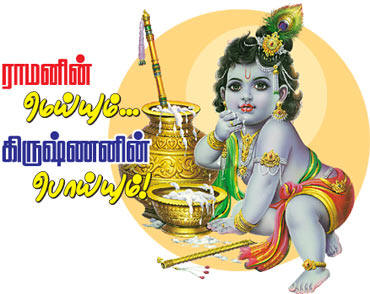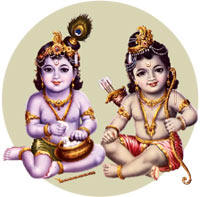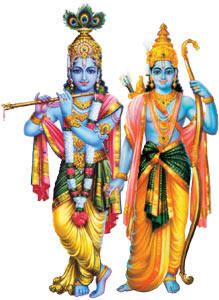ஸ்ரீகிருஷ்ண ஜயந்தி சிறப்பிதழ்
SrīKrishna
Jayanthi (Krishna’s Birthday celebration) Special Issue
Posted Date : 06:00 (08/09/2010)
Krishna was caught butter-handed with
his hand in the butter-pot.
ராமனின் மெய்யும்... கிருஷ்ணனின் பொய்யும்!
Rama’s Truth…Krishna’s Untruth.
செல்லக் கண்ணா தாலேலோ...

Srīkrishnan – This one word depicts joy, mischief, lessons...?!
Avatāras
have a special place in taking man in the righteous path, as undertaken
by the Supreme Being. ‘Avatara Tīti
Avatāra’:
The north Indian Pundits impress on us the greatness of the word Avatāra,
which means ‘Descent of God from heaven to earth.’ The Supreme Being
suspends and conceals his lofty qualities, becomes one among us, one in
our family, a listener of our words (and pleas) … Establishing among the
people, suspending his loftiness, and moving among those with
intrinsically lower human qualities. The Pundits praise this as Good
Conduct. The manifestation of Good Conduct is Avatāra.
Nārāyaṇa, the Consort of Tirumakaḷ came down from above to rescue the
souls roiling in the sea of Samsara. He brings about these Avatāras.
Though the incarnations are multitudinous, ten Avatāras were imperative
worthy of praise. Of these ten, Rama and Krishna Avatāras are special.
Reason… The other incarnations benefited the contemporaries of
their time and place. It is noteworthy that Rama and Krishna Avatāras
were of benefit to the future generations. Only in these two Avatāras,
words blossomed out of the sacred mouths of Rama and Krishna.

Rama is celebrated in the north as Maryāḍā
Puruṣōththaman
(Exemplar of Decorum/The Most Perfect man/Perfect Lord) and Krishna Līlā
Puruṣōththaman
(Lord of Divine Play). Krishna
is also Pūrṇā Avatār
(Complete Incarnation).
If you must choose one for its greatness, Krishna Avatāra
wins hands down. Srīrāma
spoke a few words here and there in our interest. But Krishna in his
Avatāra
spoke for and to us and gave us the gift of Bhagavadgītā
Śāstra
for our benefit. Viṣṇu
Sahasranāmam
as we enunciate leaves a mark on our tongue and the treasure-trove of
history of Krishna.
Rama tread the path of his injunctive virtue, not open to violation of Śāstras.
Kaṇṇaṉ
differs from Rama. Krishna’s own deeds are the path of virtue and
injunctions of Sastras. Both established Dharma and are Dharma
themselves.
Kṛṣṇa
as a word means, ‘the giver of bliss to the earth.’ The history of Srī
Kṛṣṇā
is all bliss. Krishna and Krishna history are not different. Instead of
reading other books, reading Bhāgavatam
is superior. Vyāsa
composed both Mahābhārata
and Srī
Bhāgavatam.
He was ecstatic to know that the bliss that was not available in Mahābhārata
was found in Bhāgavatam. Since we talk about the history of Krishna, we
call it Bhāgavatam.
In the readers who listen to or read the wonderful Bhāgavatam,
the seed of Bhakti sprouts taking the devotee to the path of liberation.
If we realize the birth or Avatāra
of Krishna, rebirth will not occur, that is we will attain Mukti or
liberation.
‘No Kaṇṇaṉ,
no sight of refuge’ – So said Nammāzvār.
We took birth because of Karma of former birth. But the birth of God is
not because of Karma but because of love of people.
Our history, our style of living, our behavior…often are not palatable
for ourselves. Bhagavāṉ’s
Avatāra
causes joy of bliss to him and us. Krishna says in
BG 4:9
.9: ‘He, who knows my birth and work as divine in their true nature
and accepts them as the Truth, will not be born again upon leaving his
body and comes to me O Arjuna.’
Kaṇṇaṉ’s
divine deeds are the paths to liberation the cowherd woman. Yaśodā tied
him down to the grinding stone (mortar) with ropes causing welts on his
abdomen. That is why he goes by the name Damodara. Nammalvar says,
எத்திறம் உரலினோடு இணைந்திருந்து
ஏங்கிய எளியவே (1)
2813.
Krishna is so simple that he allowed Yaśodā to punish him
by tying him to a mortar.
Nammāzvār moved by this predicament of Child Krishna, went into Turiya
state with shut eyes for six months.
The hands of a weak woman tied the Supreme Being. Just thinking he was
tied down to a mortar will loosen our Saṁsāric
(metempsychosis) ties and liberate us according to Paramāchāriyār
Nampiḷḷai.
The pundits say that Kaṇṇaṉ
was born for two reasons. One is Veṇṇai
and the other is Piṉṉai.
That is to marry Napiṉṉai.
Veṇṇai
(butter) and Piṉṉai
(the name of his bride) rhyme.
Though he received a handful of butter, he liked stealing and eating
butter. To this day, in Dwaraka temple, the devotees with enthusiasm
call him in loud voice, ‘Māhaṉ
Sōr’
(Butter thief). Hearing such accusation, the God laughs.
It is not just stealing butter from the pot; ingesting a potful of
butter, he broke the pot and obtained unending pleasure hearing the
breaking of the pot. That is the verdict of poet Periāzvār.
Kaṇṇaṉ
clapped his tiny hands and jumped for joy.
Līlāsukar
praises Krishna’s deeds in his book, Srī
Kṛishṇa Karṇāmrutham.
Kaṇṇaṉ
with a bunch of friends entered the house of a milkmaid. They with a
great deal of effort brought down the butter pot from its upper perch.
When they were about to share the loot, the milkmaid owner entered the
house. The other children escaped out of the house sighting her but Kaṇṇaṉ
was caught butter-handed by the milkmaid. As Bhagavan was wondering and plotting a
strategy in nanoseconds to escape from her, she asks the boy, “Who are you?”

Those who transgress the rules of the road and were caught by the police,
usually drop names of higher authorities or VIPs and escape.
Kaṇṇaṉ employed the same stratagem. Telling her the name of Balarāma, he
identified himself as his brother.
The reason… In the village, Balarama carried a good name. Kaṇṇaṉ dropped his brother’s name thinking he could escape. It appeared she was
not a pushover. She posed the second question, “Why did you come into my
house?”
Without giving a thought… Kaṇṇaṉ
lied, ‘I thought this was my house.’ She retorted, ‘Kaṇṇā, you would
have known when you entered that it was not your house.’ Kaṇṇaṉ fearless
and not losing his patience, said, ‘Now only, I come to know it was not
my house. Here I am leaving the house.’ So saying, he tried to slip and
slide out of her presence. The milkmaid would not give up!
“Kaṇṇā,
you are right you are the brother of Balarāma. I accept your premise
that you thought this was your house. But, I don’t understand why you
put your hand into the butter pot? What is your reason?” Hearing it,
trepidation seized Kaṇṇaṉ.
This is the most challenging question for Kaṇṇaṉ, who was titled by Aṇḍāl, ‘a Facile Lier.’
Confused as to what to tell the milkmaid, Kaṇṇaṉ says, “Ammā, I lost a calf. I wondered whether the calf was hiding in this pot and for
that reason, I put my hand into the pot.
I see, the calf is not in it. OK. I am leaving.”
So saying he ran out of the house.
See how his līlās (Divine plays) are!
